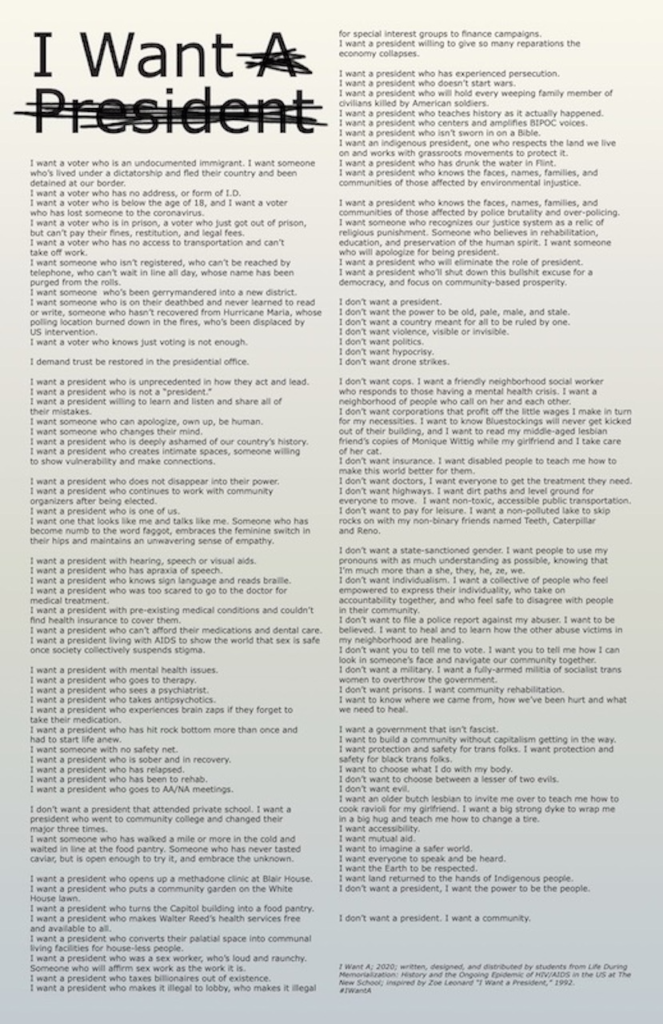Correction: Due to an editorial error, Professor Kerr’s name is Ted Kerr, not David Kerr. The piece has been edited to reflect that as such.
“Can activism be a form of memorialization?” asks Professor Ted Kerr to New School students in his class: Life During Memorialization: History and the Ongoing Epidemic of HIV/AIDS in the USA. Kerr, a writer, organizer and founding member of What Would an HIV Doula Do?, an organization that provides community based support for people living with HIV/AIDS, and those indirectly affected by the virus.
According to Merriam-Webster dictionary, a doula, in a traditional sense, is a woman experienced in childbirth who provides advice, information, emotional support, and physical comfort to a mother before, during, and just after childbirth.
What Would an HIV Doula Do’s mission and core values are centered around, “a community of people joined in response to the ongoing AIDS Crisis,” adding, “we know that since no one gets HIV alone, no one should have to deal with HIV alone. We doula ourselves, each other, institutions and culture.”
Kerr’s freelance work with POZ Magazine further illustrates the connections between the COVID-19 pandemic and society’s continued understanding of the ongoing HIV/AIDS epidemic. With How to Live With a Virus, Kerr argues that, “ Looking at HIV—past and present—we have an opportunity to build upon the lessons we have already learned about life with a virus. But we also have the opportunity to name and work through the lingering trauma of the AIDS crisis and the new and emerging feelings being formed in the age of COVID-19.”
Professor Kerr brings his work as an HIV doula to the classroom, and encourages his students to consider how HIV intersects with race, class, gender, and culture around the world.
As a student in professor Kerr’s class, my fellow classmates and I examined the HIV/AIDS crisis from a unique theoretical perspective while unpacking two pandemics side by side. We identified corollaries between HIV/AIDS and COVID-19 through a social and medical lens, and then contrasted both diseases in terms of stigma and social acceptance, the global response and mitigation efforts, and the action, or lack thereof, from those in power.
The most emphatic message from Professor Kerr’s class is that activism can take many forms. And on the tail end of a historic presidential election where the wellbeing of the greater good has relied on leadership from an administration who has ignored calls from medical professionals worldwide to stop the spread of COVID-19, it seems as if the interests of the people have become secondary. Similar to the United State’s reaction to earlier pandemics. Much like the Reagan administration’s lackluster response to the spread of HIV/AIDS which was stricken with misinformation and bias pertaining to the virus, ultimately attributing to unnecessary deaths at the onset of the epidemic. The lack of vigilance by our leaders to quell the HIV/AIDS epidemic triggered an onslaught of grassroots activism during, and well after President Reagan’s reign was over. And as we’ve observed throughout 2020, inaction by those who we choose to put into power opens a wider conversation required for change.
Inspired by Zoe Leonard’s I Want a Dyke for President, our class has collectively composed a piece that embodies community activism in written and spoken word. This student-driven collaboration is a raw and candid call for change and community-based solutions, as opposed to resolutions to social issues seeped in capitalism, authoritarianism, and a self-serving government.
This piece memorializes and speaks to, and for, those who live on the periphery of the “American Dream,” and intentionally out of view of the elite. For those who seek equality and long for prosperity. The debut of “I Want a _______” signifies the need to hold our leaders accountable and calls for continued community-based movements that employ the power of activism to ensure everyone has a seat at the table.
You can find the piece and audio below:

This Project was Done and Contributed by Students of Professor Kerr’s Class listed below:
Sophia Arnesen
Katherine Degennaro
Mickey Dick
Trevor Falsey
Katie Giovale
Carli Grossman
Hayley Jackson
Isabel Johnson
Sarah Kendric
David Moore
Kalie Nattinger
Lily Pando
Amanda Parker
Mairead Reo
Rebecca Rosset
Margaret Ryan-O’Flaherty
Patricia Schwartz
Avery Steigerwald
Rebecca Velasquez
Emma Windsor







